Honor is a big deal at all Military Academies–USNA, USAFA, West
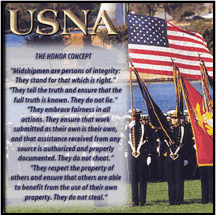
The Honor Concept becomes a Midshipman’s way of life. (USNA Admissions video, “Leaders for America 2003”)
Point, Coast Guard. It sets these schools apart from other University and Colleges–students must be honorable to graduate.
The mission of the USNA is to develop midshipmen morally, mentally and physically and to imbue them with the highest ideals of duty, honor and loyalty in order to provide graduates who are dedicated to a career of naval service and have potential for future development in mind and character to assume the highest responsibilities of command, citizenship and government (Strategic Plan, 2005).
To graduate from USNA, USAFA, Coast Guard Academy and West Point requires four factors:
- morals
- academics
- physical
- honor
None more or less important than the others. An officer isn’t more successful because he’s smarter or stronger or more moral or more honorable. He’s more successful because he’s a good mix of all these factors.
Here’s a test USNA Midshipmen must take to pass honor concept requirements:
Midshipmen Honor Concept
1. List and briefly describe the four options a midshipman has upon witnessing a possible honor offense.
2. What are the two precepts of the Honor Concept?
3. State what the “non-toleration clause” is, also specify as to where and how it is applied.
4. In the case of a not guilty plea, can the honor of the accused be used against them?
5. List and describe the three characteristics that must be met in order for a guilty plea to be accepted by the honor board.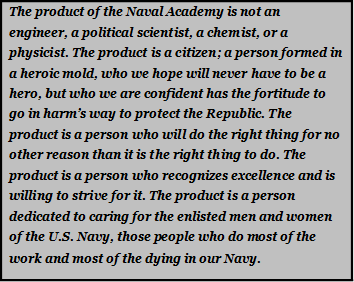
6. What where the first three commands of Fleet Admiral Nimitz.
7. What class and billet representation would be present to hear and vote upon the honor accusation of a fourth class midshipman?
8. On September 1, 1945 Fleet Admiral Nimitz participated in an historic event. Explain what transpired, as well as the name of the ship and it’s geographical location on said date.
9. What is the menu for Friday’s morning meal?
10. What does BIO stand for and what are their responsibilities pertaining to an honor case?
11. How many Honor Representatives does each company of the brigade have, and to what classes do they pertain?
12. Name the type of final vote that must be reached in order for a guilty plea to be accepted. List the minimum ratio of voting members that is required to achieve this.
13. In what building is the writing center located? When is it open?
14. What are the three vital note taking times?
15. At the end of honor remediation, what are the three recommendations the advisor can make pertaining to the remediated midshipman?
16. Name the upper class in 26th company who hold out of company honor billets, list their billet.
17. Intentionally left out
18. Final decision regarding separation or retention is made by whom following the suggestions of two other involved persons. Named the participation parties.
19. What are the days?
20. Other than the voting members, there are two additional members who do not vote. What is their function and who may fill such positions?
Check at the bottom of this post for the answers.
Convinced they take this seriously? They do, but, they are making changes. Read this recent article: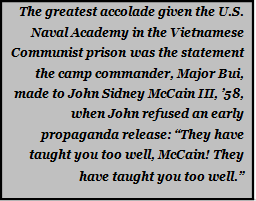
Rethinking the academy honor code
Increase in violations, second chances spur question: Is honor teachable?
By Philip Ewing pewing@militarytimes.com
ANNAPOLIS, Md. — The Naval Academy saw the highest number of honor code violations in 25 years during the 2008-2009 academic year, school records show, but most transgressors were placed on probation or tasked with “remediation,” in keeping with a trend of giving midshipmen second chances instead of kicking them out.
According to academy data provided to Navy Times, there were 172 cases of alleged honor violations in that academic year, of which 140 were substantiated. Twenty-one midshipmen resigned or were separated for honor code transgressions, and 120 of them were given probation or remediation. The numbers for allegations, proved cases and probation or remediation were the highest since the 1983-84 year, the earliest for which records are available.
On March 8, Naval Academy Commandant Capt. Matt Klunder told the school’s Board of Visitors that he has been working with the Brigade of Midshipmen on changes to the academy’s “honor concept,” which he said had been a longstanding goal.
Although Klunder said the honor code revisions hadn’t been spurred by recent events, the ethics discussion follows the academy’s controversial decision to permit a football star to stay at the school after testing positive for marijuana use. Current and former midshipmen are continuing to grapple with questions that incident raised for the school’s current honor concept.
Does it still work? Is it applied equally? Should a mid who has broken it get more chances?
Yes, said Klunder, who said one of the central concepts is to let people learn from a mistake.
“The goal is not to have them replicate it again — once you get an honor violation, if you do, as a young person, we’ll get you fixed, we’ll get you remediated, and we’ll never see that again,” he said.
No, said Dick Couch, a retired SEAL captain who taught ethics at the academy last year and is a well known writer on ethics in the military. “Honor is being treated as a teachable thing, as if there is some trial and error with it, and that’s the current stance. I don’t particularly agree with it,” he said.
The question of enforcing honor — over which the brigade itself has a large measure of control — was brought front and center earlier this year by the story of Midshipman 3rd Class Marcus Curry.
When Curry, a star football player, popped positive in January for marijuana, it was his fourth run-in with the honor code, a source with knowledge of the situation said. The source was not authorized to talk about internal academy dynamics and asked not to be identified.
Curry technically violated the code only once, when he allegedly submitted a plagiarized assignment, the source said, but he was accused of two other infractions, one of which was not substantiated and the second of which was thrown out “on a technicality.” So, too, with Curry’s marijuana test, critics said: Naval Academy Superintendent Vice Adm. Jeffrey Fowler ruled it was not an infraction because Curry said he hadn’t known what he was smoking, and a service member has to be aware he’s taking an illegal drug to run afoul of the Navy’s rules.
In the old days, a midshipman would have been ejected after one violation, Couch and other Naval Academy alumni told Navy Times.
“That’s the way it was, but it’s not that way today,” said Couch, who graduated in 1967. “They’ve moved too far in the direction of tolerance
— these things are now tolerated at the academy, tolerated in that it’s felt [honor] can be taught, remediated, instilled into people who come in without those qualities.”
But not only do academy officials insist remediation is valuable, they dispute the premise that “in the old days,” a single transgression meant a trip home.
Probation and remediation have been part of the honor code at the academy for decades, according to school records. At the same time, giving mids a second chance has become much more common than kicking them out: Starting with the 1997-98 academic year, every year since has seen remediation cases exceed resignations or ejections.
Work in progress
Last year, Couch asked his class of sophomores how many of them thought cheating was widespread at the academy. Every hand in the class went up, he remembered. That doesn’t implicate every midshipman on the Yard, Couch said, but midshipmen and the administration have perpetuated what he called a culture of permissiveness. It’s gotten to the point that Couch, who advises U.S. Special Operations Command on battlefield ethics, has told SOCom commanders they can’t assume potential operators coming from the academy are morally qualified.
“I think my issue … is that we’re doing a great disservice to the overwhelming number of honorable people at the academy,” he said. “Overwhelmingly the graduates of the Naval Academy are honorable people. Certainly, when I lectured there, I made it clear that honor is our stock and trade, the people you work for … don’t care what you know, they just want to know they can trust you. Honor and trust are centerpieces.” On that point, Fowler, who graduated from the academy in 1978, and Klunder, class of 1982, agree. But Klunder said pending changes to the honor concept, which will include an “honor congress,” were not brought on by recent events.
“Absolutely not, and I’m being completely sincere,” he said. “When I first came here in June of ’08, talking with everyone, not just midshipmen, it was clear to me that where we were with the honor concept was confusing.” The honor concept was last updated in the 2005-2006 academic year.
Klunder said he couldn’t discuss what changes were in the works, but he described the premise of his honor project to the academy’s Board of Visitors: “We’ve always stood for honor, but did we all understand it?” he said. “We needed some work on that.”
Times change, but do you think this is a good change?
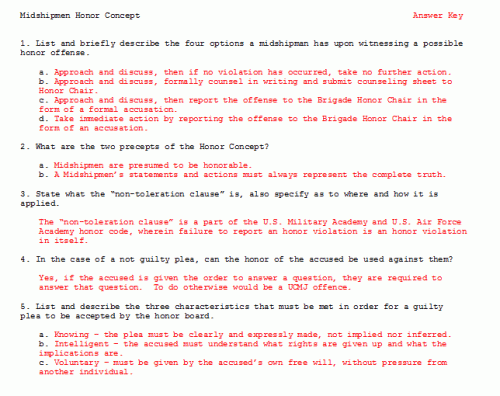
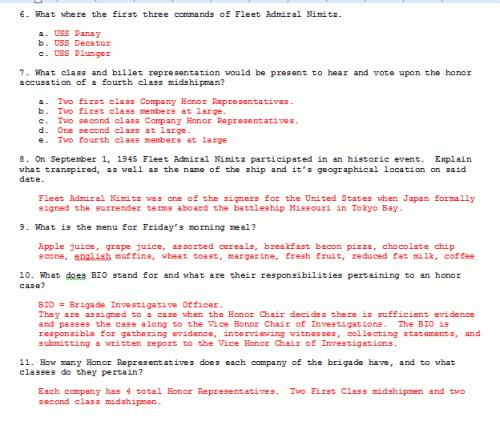
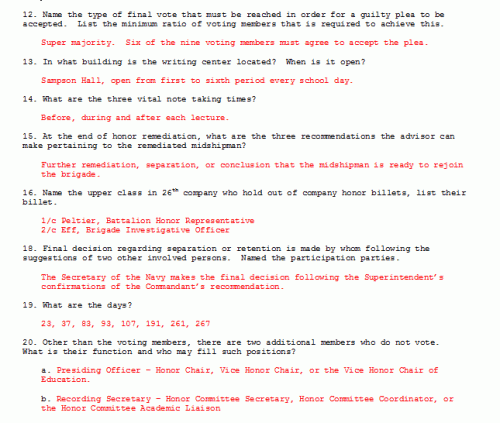



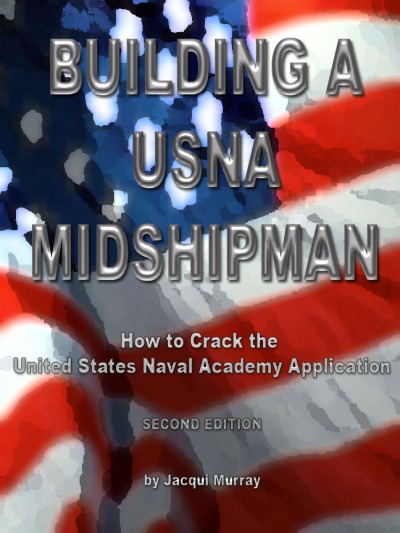


































[…] Read about the USNA Honor Concept […]
LikeLike
By: March To Do List for USNA Applicants « USNA or Bust! on 03/07/2011
at 08:57
[…] Read about the USNA Honor Concept […]
LikeLike
By: March To Do List for USNA Applicants | USNA or Bust! on 03/04/2013
at 00:28
[…] Read about the USNA Honor Concept […]
LikeLike
By: April To Do List for USNA Applicants | USNA or Bust! on 04/01/2013
at 01:01
[…] What is the USNA Honor Code?–not many universities require ‘honor’ of their applicants. USNA does. What’s that mean? […]
LikeLike
By: 10 Hits and Misses for 2013 | USNA or Bust! on 01/06/2014
at 00:57
[…] Read about the USNA Honor Concept […]
LikeLike
By: March To Do List for USNA Applicants | USNA or Bust! on 03/10/2014
at 03:44
[…] Read about the USNA Honor Concept […]
LikeLike
By: April To Do List for USNA Applicants | USNA or Bust! on 04/15/2014
at 00:55
[…] Read about the USNA Honor Concept […]
LikeLike
By: May To Do List for USNA Applicants | USNA or Bust! on 05/05/2014
at 00:54
[…] Read about the USNA Honor Concept […]
LikeLike
By: June To Do List for USNA Applicants | USNA or Bust! on 06/02/2014
at 00:10
[…] Read about the USNA Honor Concept […]
LikeLike
By: July To Do List for USNA Applicants | USNA or Bust! on 06/30/2014
at 00:10
[…] Read about the USNA Honor Concept […]
LikeLike
By: August To Do List for USNA Applicants | USNA or Bust! on 08/04/2014
at 00:09
[…] Read about the USNA Honor Concept […]
LikeLike
By: September To Do List for USNA Applicants | USNA or Bust! on 09/01/2014
at 00:11
[…] Read about the USNA Honor Concept […]
LikeLike
By: October To Do List for USNA Applicants | USNA or Bust! on 09/29/2014
at 00:50
[…] What is the USNA Honor Code?–not many universities require ‘honor’ of their applicants. USNA does. What’s that mean? […]
LikeLike
By: 10 Hits and Misses for 2014 | USNA or Bust! on 01/09/2015
at 00:56
[…] Read about the USNA Honor Concept […]
LikeLike
By: May To Do List for USNA Applicants update | USNA or Bust! on 05/02/2022
at 02:22
[…] Read about the USNA Honor Concept […]
LikeLike
By: June To Do List for USNA Applicants update | USNA or Bust! on 06/02/2022
at 02:20
[…] Read about the USNA Honor Concept […]
LikeLike
By: July To Do List for USNA Applicants update | USNA or Bust! on 07/02/2022
at 02:22
[…] Read about the USNA Honor Concept […]
LikeLike
By: August To Do List for USNA Applicants update | USNA or Bust! on 08/02/2022
at 02:21
[…] Read about the USNA Honor Concept […]
LikeLike
By: October ToDo for USNA Applicants | USNA or Bust! on 10/02/2022
at 02:21
[…] Read about the USNA Honor Concept […]
LikeLike
By: March To Do List for USNA Applicants update | USNA or Bust! on 03/01/2024
at 17:16
[…] Read about the USNA Honor Concept […]
LikeLike
By: April To Do List for USNA Applicants update | USNA or Bust! on 04/01/2024
at 17:24